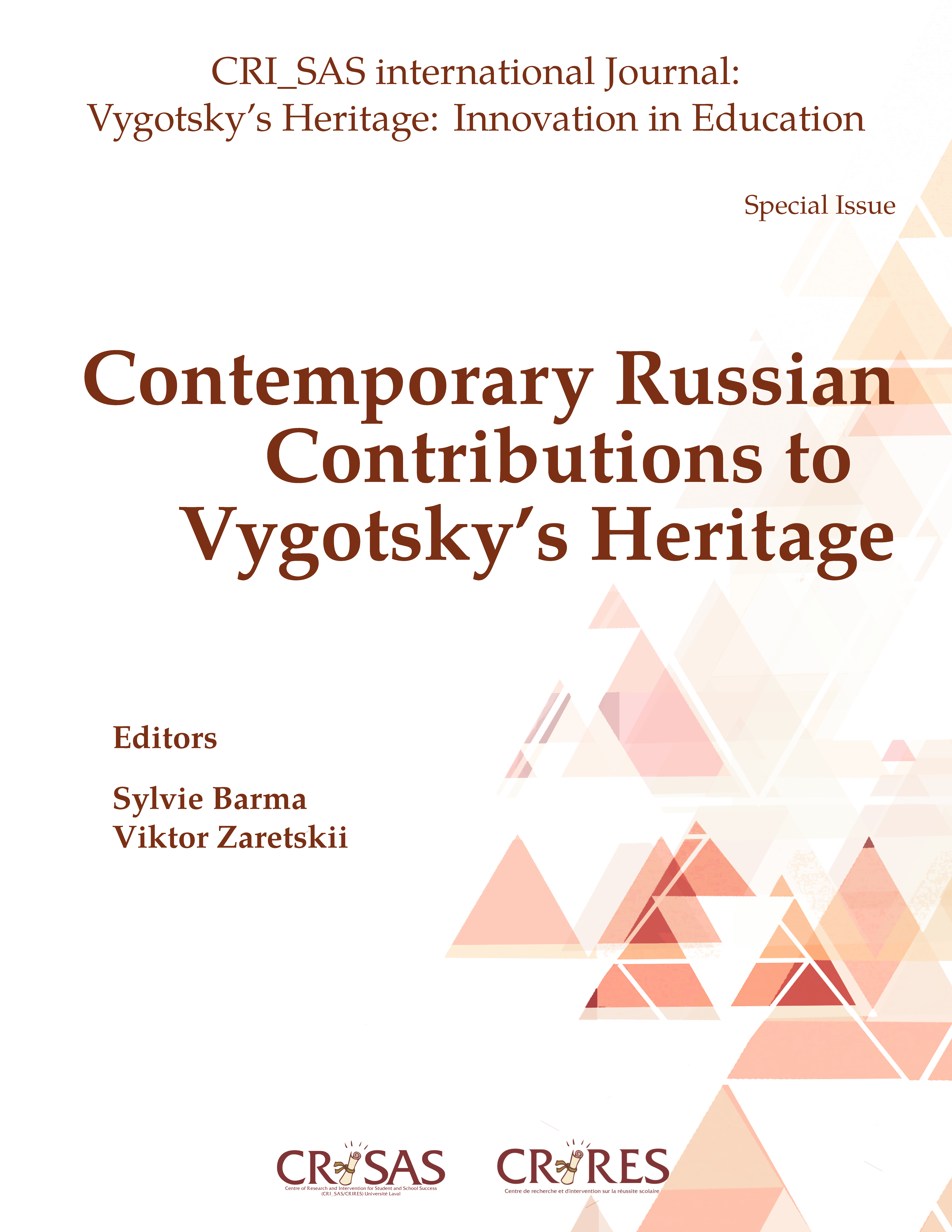Subjectness Position Relative to Educational Activities in Different Age Periods
DOI :
https://doi.org/10.51657/ric.v4i1.41010Mots-clés :
Subjectness position, Educational activities, Subjectivity, Reflexive-activity approach, Junior schoolchildren, Adolescents, Senior schoolchildren, Awareness, Reflection, Educational difficulties overcomingRésumé
The concept of subjectness position relative to educational activities is considered in the article as one of the central one for the reflexive-activity approach. The author’s defini-tion of this concept is given. The main results of the research concerning the attitude to educational activities in di˙erent age periods among Russian school’s pupils are given, which show that, on the one hand, it is the subjectness position that is extremely impor-tant for many aspects of educational activities, but at the same time the Russian pupils subjectness position intensity decreases in the adolescent period. Nevertheless, in Russia there are pedagogical systems that contribute to the development of the pupils’ subjectness position.
Références
Deci, E. L.,&Ryan, R. M. (2002). Handbook of self-determination research. Rochester: University of Rochester Press.
Engeström, Y. (2006). Development, movement and agency: Breaking away into my corrhizae activities. In K. Yamazumi (Ed.), Building activity theory in practice: Toward the next generation. Osaka: Center for Human Activity Theory.
Grawe, K. (2006). Agents of change in the processes of psychotherapy. IFP Newsletter, 1, 7–17.
Griffin, E. A. (1997). A first look at communication theory (3rd ed ed.). New York: McGraw- Hill.
Mangels, J. A., Butterfield, B., Lamb, J., Good, C., & Dweck, C. S. (2006). Why do beliefs about intelligence influence learning success? A social cognitive neuroscience model. Social Cognitive and Affective Neuroscience, 1(2), 75-86. doi: 10.1093/scan/nsl013
Nutten, J. (2004). Motivation, action and the prospect of the future. Moscow: Smysl.
Obukhov, A. S. (2010). The age aspect of the research activity development: from spontaneous behavior to subjectum formation. In A. S. Obuhov (Ed.), Research activity of pupils: from the kindergarten to the university: the scientific and methodological collection in two volumes (pp. 42–48). Moscow: All-Russian Public Movement of Creative Pedagogues “Researcher”; MPSU.
Pakhomova, O. (2004). Difficulties of translation. http://psy.1september.ru/article.php ?ID=200403314.
Rice, F., & Dolgin, K. (2012). Psychology of adolescence and pre-adult age. St. Petersburg: Peter.
Vygotsky, L. S. (1984). Collected works in 6 volumes. Vol. 4. Moscow: Pedagogika.
Yakimanskaya, I. S. (1996). Personally oriented education in the modern school. Moskow: September.
Zaretskii, V. K. (2001). What does the consultant on the problem solving process. In V. K. Zaretskii & M. M. Gordon (Eds.), Summer school for children with developmental features: the work experience. (pp. 107–120). Nytva: REM, IPI RAE.
Zaretskii, V. K. (2013). The formation and essence of the reflexive-activity approach in the provision of the consultative psychological counseling. Consultative psychology and psychotherapy, 2, 8–37.
Zaretskii, V. K., & Zaretskii, Y. V. (2012). Subjectness position of the child in the educational difficulties overcoming (the case from practice). Consultative psychology and psychotherapy(2), 110–133.
Zaretskii, Y. V. (2013). The subjectness position in relation to the educational activity as the resource for development and the subject of research. Consultative psychology and psychotherapy(2), 110–128.
Zaretskii, Y. V., Zaretskii, V. K.,&Kulagina, I. Y. (2014). Metodika issledovaniya sub”ektnoi pozitsii uchashchikhsya raznykh vozrastov [Methods of study of a subject position of pupils]. Psikhologicheskaya nauka i obrazovanie [Psychological science and Education](1), 98–109.
Zukerman, G. A., &Wenger, A. L. (2010). Development of educational independence. Moscow: EHDE.
Téléchargements
Publié
Numéro
Rubrique
Licence
© Yuriy V. Zaretskii 2017

Cette œuvre est sous licence Creative Commons Attribution - Pas d'Utilisation Commerciale - Pas de Modification 4.0 International.

